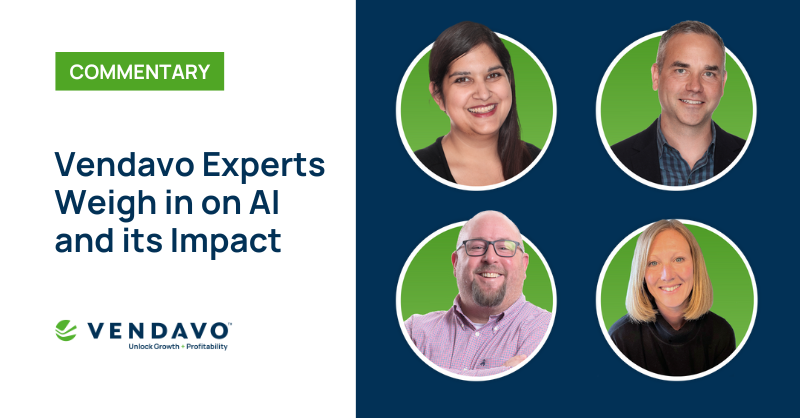
Artificial Intelligence is Taking the World by Storm
In today’s rapidly evolving business landscape, companies are increasingly turning to artificial intelligence (AI) to help them make data-driven decisions that support their bottom line. At Vendavo, we believe that responsible innovation is key to the successful adoption of AI, and that human collaboration is critical to unlocking its full potential. That’s why we take a hybrid approach, where humans and machines work together to achieve the best possible outcomes.
We’ve gathered insights from Vendavo experts on the impact of AI in the business world. From the art of what’s possible with AI, to the ethical considerations of AI-powered decision-making, our experts weigh in on the opportunities and challenges. By sharing our knowledge and experience, we hope to provide a better understanding of the role that AI can play in pricing, and how it can be used responsibly and ethically to support human expertise.
How Vendavo Experts See AI

“Armed with detailed insights on willingness to pay and the gaps of what people pay today vs. what they may pay in the future, you can create a list of targeted opportunities for the sales team. Trust me, there is nothing they would love more!”

“The buzz around AI has often focused on positioning man vs. machine. When will AI be ‘smarter’ than us? What will that mean? But we like to take a more pragmatic perspective and look for ways that machines (AIs) can work together with humans to help augment intelligent decision-making such as identifying the right product, at the right price, and at the right time.”

“The technology is here to stay! AI and chatbots are already heavily used for different tasks, especially tasks which are repetitive. I think we will see more investment into AI driven assistants, as companies try to create better operating models, lower cost, and free up human resources to deal with more custom problems, which can also be eventually automated via AI. I remember in University I did a course called, ‘The Social Implications of a Computerized Society’. While this was in the early 2000s, what I found fascinating was while Technology can move rapidly, the bigger question was always if society will move as fast! I think the latter will be the biggest factor on how fast AI and chatbots grow in the future.”

“AI will have a major impact on future growth for the enterprise. Specifically, around customer service and increased automation. With AI it will allow very routine tasks to be completed automatically with very little human intervention, to allow those resources to focus on higher level strategic projects. Customer Service AI-powered chatbots on demand will provide a faster, more direct solution for customers at any time they request, which will lead to higher satisfaction and retention rates.”

“The greatest risk would be in allowing any AI tool to dictate a substantial portion of the pricing process without clarity and oversight. If it is positioned as all-knowing but opaque, people will have to either trust it blindly or reject it suspiciously. Even in the perfect case, any AI model is going to be constrained by the dataset that it was trained on. A model with generic training might uncover blind spot opportunities in your business, but it may also fail to consider your unique value drivers. On the other hand, a model trained for your internal dataset would only help consistently execute in the same way as has been done in the past while missing improvements. The benefit will be realized in properly blending these training approaches backed with clear rationalization so users can confidently create consistent sales execution strategies with optimal outcomes.”

“There’s no doubt that AI has the potential to dramatically change the way we operate, improve efficiency, and enhance many human-driven processes. The challenge ahead of us is to create and use models built on responsible and ethical principles – acting early to design in a way that protects privacy, confidentiality, and intellectual property, and educating users to the risks and limitations. In the legal world we are already seeing consequences for businesses that do not do that. At Vendavo, responsible innovation is at the heart of everything we do, and our approach to AI is similar: exploring how to get the most out of technology for the benefit of our teams and our customers, without compromising the high security and privacy standards they expect of us. There is so much potential to properly implemented AI, and I am excited to see that unfold.”

“As businesses shift from backwards looking insights such as descriptive analytics to looking for help with predictive and prescriptive guidance AI can play a significant role. How fast we are at adopting the recommendations is another story. Users are looking to reduce the effort in decision making and taking actions. They also want to reduce the complexity of understanding how we came to the conclusion. Building the connections between the what and the why will help businesses get over the hump of accepting AI for guidance and strategy.

“Finding areas to improve efficiency and reduce manual effort have always been key tenants of any finance and accounting team. Adoption of technology, and software tools in particular, have provided the single greatest quantum leap for finance and accounting teams. Use of software to reduce manual, or excel based efforts, have allowed teams to focus more on the strategic areas of finance and to reduce close periods. With the recent onslaught of new AI tools, most notably ChatGBT, demonstrating to the world that AI has made substantial leaps forward, this will be an important moment in time for finance and accounting teams to adapt with and utilize the technology to change their day to day lives. The ability to reduce manual tasks through improved, AI assisted, matching for journal entries, or accounts payable/receivable teams could work to reduce monthly close times even more. Predictive AI could be a benefit for forecasting/planning in FP&A to help avoid pitfalls of the past.
However, there are still clear limitations in the current AI offerings that will require a human mind, and reasoning, that cannot be replicated in it’s current form. We should embrace the technology to lessen our time spent on remedial tasks, but not let it become a replacement for rationale thought or decision making.”

“The release of ChatGPT will almost certainly be chronicled as one of the most pivotal moments in computing. It would be terribly difficult for anyone to fully comprehend the impact of AI on society, because their lens would likely be too narrow as history would suggest. Ignoring the unprecedented enthusiasm surrounding generative AI, the latest innovations in machine learning and computing infrastructure have made the once impossible now possible. The most important thing we can do is keep an open mind with an insatiable curiosity about the future, yet temper those thoughts with doses of reality and skepticism. One thing we know in the world of computing is that virtually everything gets democratized over time, and that kind of mass accessibility will open the aperture of innovation in ways that are hard to imagine.”

“While AI itself isn’t new, the way we’re using it on a daily basis, as a society, and in a mainstream way is. I find tools like ChatGPT helpful in order to elevate or quicken how fast I can do my job, but we’re not out of the woods. Right now there’s no replacing human expertise – comprehensive research, deductive reasoning, communication, and creative work can’t be beat.”

“If you’re a marketer in charge of content, brand storytelling, messaging, or any other aspect of creating customer-facing content, AI is a bit of a double edged sword. While it can certainly help streamline processes and improve efficiency, it can also lead to a flood of generic, robotic content that fails to connect with your audience.
As AI becomes more prevalent, it’s important to be proactive in setting guidelines and expectations around its use – no matter the department. For marketers, revisit your brand and editorial guidelines, and ensure they’re clear, accessible, and easy to follow. Educate your internal and external subject matter experts on the do’s and don’ts of using AI. Systematize your editorial approach by building templates and checklists, so you can delegate editing tasks with ease. As with any new technology, there’s a learning curve. But with the right approach and guidelines in place, AI can be a valuable tool in creating high-quality, engaging content.
We hope that by sharing our knowledge and experience, we can provide a better understanding of how AI can be used to support human expertise in business, and how we can use it responsibly and ethically to drive greater efficiencies, innovation, and business outcomes. For more information about Vendavo’s position on AI see our guiding principles.
